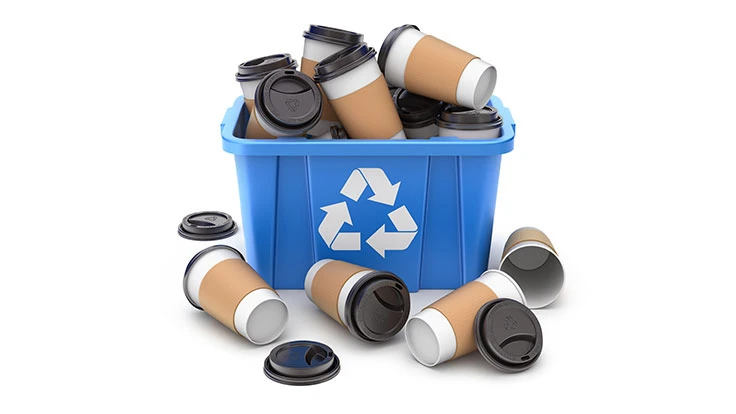
©mipan | stock.adobe.com
Houston-based waste management and recycling company FCC Environmental Services has installed new robotic sorting technology at its material recovery facility (MRF) in Dallas that allows the site to begin accepting paper cups and more efficiently capture food and beverage cartons.
“We struggled to remove cartons and cups previously, plus the mixed-paper mills don’t like too much of that material in their bales,” FCC Senior General Manager Bruce Magnuson tells Recycling Today. “Now, we can remove cartons and cups and sell them separately.”
FCC partnered with Louisville, Colorado-based technology provider Amp Robotics on the installation, opting for Amp’s Cortex unit—a high-speed robotic sorting system guided by artificial intelligence (AI). FCC says it will sort the paper cups and cartons into a higher-value poly grade bale.
RELATED: Amp releases Cortex-C robotics system
The Dallas MRF currently serves about 500,000 households in the Dallas metropolitan area, and since the installation of the Cortex system, Magnuson tells Recycling Today the amount of recyclables lost to residue has decreased nearly 11 percent.
Funding for the robotic system was provided by a collaborative equipment grant from the Carton Council of North America, the Foodservice Packaging Institute (FPI) and the NextGen Consortium.
“Our equipment grant program is designed to help organizations invest in new recycling infrastructure and drive innovation in waste management,” FPI President Natha Dempsey says.
FCC’s Dallas MRF joins a number of other facilities that have begun accepting paper cups through residential recycling programs, including MRFs in Madison, Wisconsin; Hartsville, South Carolina; as well as across the Carolinas.
RELATED: Paper mills commit to increase recycling of paper cups
“This robotic sorting and AI is a great example of how technology can help improve recycling and ultimately contribute to our circular economy by capturing more recyclable materials,” says Larine Urbina, vice president of communications at the Carton Council. “Collaboration with others throughout the recycling value chain is a cornerstone of the Carton Council’s strategy.”
Latest from Recycling Today
- BMW Group, Encory launch 'direct recycling’ of batteries
- Loom Carbon, RTI International partner to scale textile recycling technology
- Goodwill Industries of West Michigan, American Glass Mosaics partner to divert glass from landfill
- CARI forms federal advocacy partnership
- Monthly packaging papers shipments down in November
- STEEL Act aims to enhance trade enforcement to prevent dumping of steel in the US
- San Francisco schools introduce compostable lunch trays
- Aduro graduates from Shell GameChanger program





